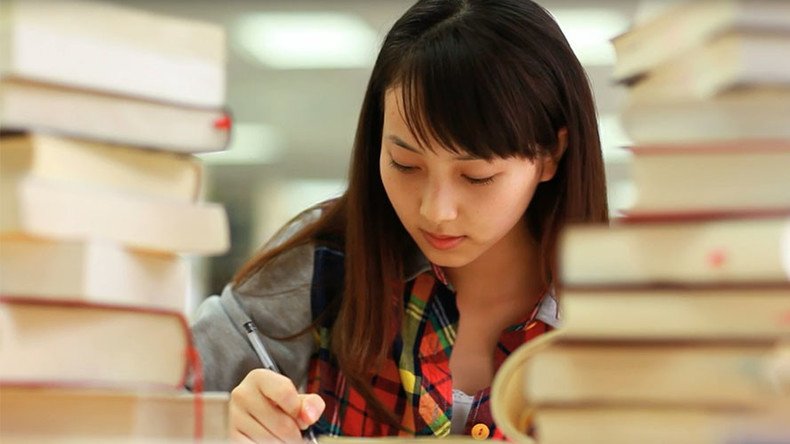Singapore, other Asian countries dominate new international education rankings

The Programme for International Student Assessment (PISA) has released its newest mass comparative survey of school education across 72 different countries, which sees Singapore, Hong Kong and other affluent Chinese-majority entities top the table.
Last year, PISA, which is funded by the OECD, gave a standardized test to 540,000 15-year-olds, examining their proficiency in reading, math, and science, the first such survey for three years.
Singapore came first in every one of the three categories.
A PISA case study supplied with the survey says that while the historical success of Singapore was based on efficiently preparing students for its burgeoning manufacturing sector, in recent years there has been a move towards “increased flexibility and variety” and now “each school in Singapore offers a range of learning experiences to develop students holistically.”
It also adds that “teachers are the pillars of Singapore’s education system” who inhabit “a culture of dedication, collaborative learning and professional excellence.”
#Singapore tops latest #OECDPISA global education survey https://t.co/pQOcFiGOks#SDG4pic.twitter.com/RCzALOL6IE
— OECD Education (@OECDEduSkills) December 6, 2016
Macao, an autonomous region of China, was third in math, sixth in science, and 12th in reading, while Hong Kong, another former European colony now under Chinese rule, is second in math and reading and ninth in science. Taiwan, and mainland China, where schools in four large cities were chosen as the sample, also feature prominently among the leaders.
Japan and South Korea were two other Asian states in and around the top 10.
Estonia was cumulatively ranked higher than any other European state, with its next-door neighbor Finland close behind. Canada and New Zealand also scored well.
The US was a mediocre performer, coming 39th in math, 25th in science and 24th in reading. The UK marginally improved its 2012 results, with its schoolchildren ranked 15th in science, and 22nd in reading, but only 27th in math.
On the new PISA school achievement test, white Americans scored in Science (533) like Finns.https://t.co/x8Yia0sqoEpic.twitter.com/uwruSyGGjQ
— Steve Sailer (@Steve_Sailer) December 6, 2016
Scotland has recorded its worst scores in the OECD's PISA surveys since the tests started in 2000: https://t.co/ZKjucw42HApic.twitter.com/q0BykftNwE
— Philip Sim (@BBCPhilipSim) December 6, 2016
Russia was 25th in math, 26th in reading, and 32nd in science.
The PISA report runs to nearly 1,000 pages, and behind the headline figures there is a complex mix of statistical quirks, intractable factors, and policies, both successful and failed, which may not themselves be fully reflected in the crude test result numbers.
Nonetheless, some patterns do emerge.
“The report reveals the policies in place that successful countries share: high and universal expectations for all students; a strong focus on great teaching; resources targeted at struggling students and schools; and a commitment to coherent, long-term strategies,” said PISA in a statement.
Even relative poverty in wealthier countries, not to mention absolute poverty in developing states, seems to correlate with significantly poorer outcomes
“Disadvantaged students in OECD countries are, on average, almost 3 times more likely to be low performers than advantaged students. They also tend to spend 35 minutes per week less in regular science lessons, are twice as likely to have repeated a grade by the time they sit the PISA test, and almost three times more likely to be enrolled in a vocational rather than an academic track.”
PISA 2015 science: Cda’s immigration success story: high immigration & high scores #CDNed#OECDPISApic.twitter.com/faP1MTUxD9
— CMEC (@CCMEC) December 6, 2016
Immigrants also tend to perform worse than natives – though the gap is narrowing – and while girls do better than boys in most Western states, boys dominate the very top results in science, in every country but Finland.
Authors also expressed concern that as the pace of innovation continues to be relentless, “science education is not keeping up.”
“While spending per student in primary and secondary education increased by almost 20% since 2006 in OECD countries alone, only 12 of the 72 countries and economies assessed in PISA have seen their science performance improve over this period,” say the authors.
On the basis of the findings, PISA has recommended four key measures that would raise performance even in the most successful education systems. These include extra resources including “free-of-charge tutoring” for disadvantaged students, who bring down the average, a delay in the sorting process that puts children into advanced and basic streams and schools at an early age, and a fight against stereotypes that sees certain genders and ethnicities pushed into certain subjects and expectations.












